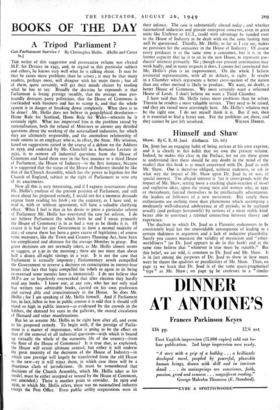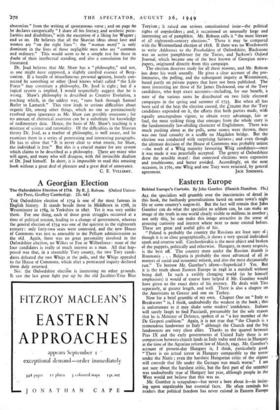Himself and Shaw
Shaw. By C. E. M. Joad. (Gollancz. 12s. 6d.)
DR. JOAD has an engaging habit of being serious at his own expense, and it is clearly to this habit that we owe the present volume. Indeed, he makes this clear in the Preface, for we are there given to understand (lest there should be any doubt in the mind of the reader) that this book is as much concerned with Dr. load as with Mr. Shaw. One is therefore obliged, without rudeness, to ask in what way the impact of Mr. Shaw upon Dr. Joad is, or was, of special interest. The alleged interest is !tat it corresponds with the impact of Mr. Shaw, setting loose a cracking chain-reaction of novel and explosive ideas, upon the young men and women who, in 191C or thereabouts, fancied themselves to be intellectually adventurous, the leaders or followers of a new movement. But surely these enthusiasms are nothing more than phenomena which accompany a moderately well-educated adolescence at all periods, to be replaced usually (and perhaps fortunately) by notions of a more stable kind. better able to construct a rational connection between theory and experience.
The dualism to which Dr. Joad as a Platonist endeavours to be consistently loyal has the unavoidable consequence of leading to a certain shakiness in argument and a lack of inductive plausibility. Surely you cannot maintain the validity of mysticism and "other- worldliness" (as Dr. Joad appears to do in this book) and at the same time believe that " whatever is true must be statable." But this belief, we are told, is common to Dr. Joad and Mr. Shaw. It is in fact among the purposes of Dr. load to show in how mans ways he shares the qualities or peculiarities of Mr. Shaw. Thus, on page 51 we learn that Dr. Joad is of the same quasi-pragmatical " type " as Mr. Shaw ; on page 54 he confesses to a " similar abstention" from the writing of spontaneous verse ; and on page 6o he declares categorically " I share all his literary, and aesthetic pecu- liarities and disabilities," with the exception of a liking for Wagner ; and so on. He believes that all the Shavian ideas about love and women are "on the right lines ": the "woman motif " is only dominant in the lives of those negligible men who are "common and ordinary." This would seem to be a simple test for those in doubt of their intellectual standing, and also a consolation for the frustrated.
Dr. Joad believes that Mr. Shaw has a " philosophy," and not, as one might have supposed, a slightly curdled essence of Berg- sonism. If a bundle of miscellaneous personal "pinion, loosely con- nected by something or other (Joad knows what) called " the Life Force " may constitute a philosophy, Dr. Joad is right ; but if a logical system is implied, I would respectfully suggest that he is wrong. Shaw's philosophy is described as Creative Evolution, a teaching which, in the oddest way, " runs back through Samuel Butler to Lamarck." This view leads to serious difficulties about organic life, among other things, which no one so pertinaciously resolved upon ignorance as Mr. Shaw can possibly overcome ; for no amount of rhetorical assertion can be a substitute for knowledge of rudimentary data. Hence, the basis of Mr. Shaw's teaching is a mistrust of science and rationality. Of the difficulties in the Shavian theory Dr. Joad, as a teacher of philosophy, is well aware, and he examines them in a series of penetrating and interesting paragraphs. He has to allow that " It is never clear to what extent, for Shaw, the individual is free." But this is a crucial matter for any system which claims to be described as a philosophy. There are many who will agree, and many who will disagree, with the invincible dualism of Dr. Joad himself. In short, it is impossible to read this amusing book without a great deal of pleasure and a great deal of annoyance.
C. E. VULLIAMY.































 Previous page
Previous page